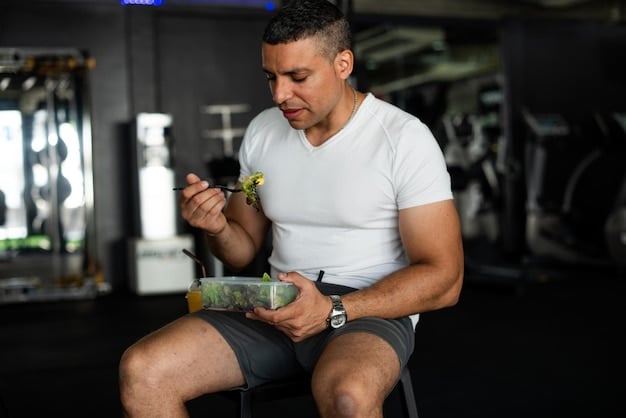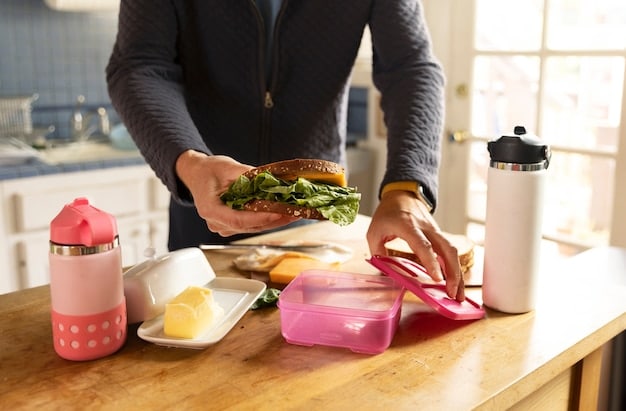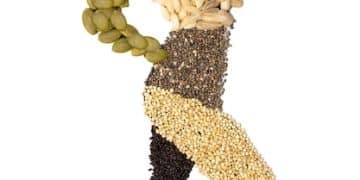Gluten-Free Bodybuilding Nutrition Plan: Athletes’ Guide

For sensitive athletes seeking to optimize their physique and performance, a gluten-free bodybuilding nutrition plan meticulously avoids gluten-containing grains while prioritizing nutrient-dense whole foods to support muscle growth, recovery, and overall health without compromising dietary adherence or digestive comfort.
Embarking on a bodybuilding journey demands precision in every aspect, particularly nutrition. For athletes with sensitivities, such as gluten intolerance, this path requires a specialized approach. The Gluten-Free Bodybuilding Nutrition Plan: A Complete Guide for Sensitive Athletes offers a comprehensive framework to achieve peak physical condition without compromising health or performance, ensuring every meal fuels growth and recovery effectively.
Understanding Gluten and Its Impact on Athletes
Gluten, a protein found in wheat, barley, and rye, can significantly impact individuals with celiac disease, non-celiac gluten sensitivity, or even those experiencing mild digestive discomfort. For athletes, particularly bodybuilders, the implications extend beyond gut health, potentially affecting nutrient absorption, energy levels, and recovery, which are crucial for muscle synthesis and performance.
Many athletes report feeling sluggish, bloated, or experiencing gastrointestinal issues after consuming gluten, which can directly impede training intensity and consistency. Adopting a gluten-free diet is not merely a trend; for sensitive athletes, it’s a strategic move to optimize their physiological environment for superior training adaptations and competitive readiness.
What is Gluten and Why Does It Matter?
Gluten acts as a binder, giving elasticity to dough and a chewy texture to baked goods. While harmless for most, it triggers an autoimmune response in celiac disease, damaging the small intestine and impairing nutrient absorption. For non-celiac gluten sensitivity, symptoms can manifest as bloating, fatigue, headaches, or joint pain, all of which directly hinder an athlete’s ability to perform and recover efficiently.
- Digestive Distress: Symptoms like bloating, gas, stomach pain, and irregular bowel movements.
- Nutrient Malabsorption: Chronic irritation can reduce the absorption of vital vitamins and minerals.
- Inflammation: Systemic inflammation can impact recovery and increase injury risk.
- Energy Levels: Impaired nutrient absorption and digestive issues often lead to chronic fatigue.
Understanding these potential impacts is the first step toward tailoring a nutrition plan that supports robust health and maximizing bodybuilding results, ensuring every meal contributes positively to the athlete’s goals.
Transitioning to a gluten-free diet for bodybuilding isn’t about restriction; it’s about intelligent substitution and broadening dietary horizons. It involves prioritizing naturally gluten-free whole foods that underpin muscle growth and energy. Athletes learn to navigate food labels and identify hidden sources of gluten in processed foods, becoming more discerning about their nutritional intake.
This careful approach helps to mitigate the adverse effects of gluten exposure, allowing the body to recover more efficiently and absorb nutrients optimally. Ultimately, a well-executed gluten-free plan supports not just performance, but also long-term health and well-being, which are foundational for a sustainable bodybuilding career.
Macronutrient Ratios for Gluten-Free Bodybuilding
Optimal macronutrient ratios are the cornerstone of any effective bodybuilding nutrition plan, and this holds true for a gluten-free approach. The key is to source carbohydrates, proteins, and fats from naturally gluten-free foods that support muscle protein synthesis, provide sustained energy, and facilitate recovery. These ratios must be personalized based on the athlete’s specific goals, training intensity, body composition, and individual metabolic response.
General guidelines often suggest a balance tilted towards protein and complex carbohydrates, with moderate healthy fats. However, within a gluten-free framework, the source of these macronutrients becomes paramount. Focusing on whole, unprocessed foods reduces the risk of accidental gluten exposure and ensures a higher nutrient density, which is crucial for sensitive athletes.
Protein: The Muscle Builder
Protein is non-negotiable for muscle repair and growth. For gluten-free bodybuilders, excellent sources include lean meats, poultry, fish, eggs, and dairy. Plant-based proteins like legumes, quinoa, and tofu are also highly valuable. The focus should be on consistent intake throughout the day to support continuous muscle protein synthesis.
- Animal Sources: Chicken breast, turkey, lean beef, salmon, cod, eggs, Greek yogurt, cottage cheese.
- Plant-Based Sources: Lentils, chickpeas, black beans, quinoa, edamame, tempeh, peas, gluten-free vegan protein powders.
Aim for approximately 1.6 to 2.2 grams of protein per kilogram of body weight, distributed across 4-6 meals. This strategy helps maintain a positive nitrogen balance, essential for muscle anabolism. Protein also contributes to satiety, helping manage appetite during caloric deficits or surpluses.
For sensitive athletes, ensuring adequate protein intake from diverse, easily digestible gluten-free sources is crucial. Protein powders should be specifically certified gluten-free to avoid contamination risks, especially if digestive issues are a primary concern. The quality and source of protein can significantly impact an athlete’s ability to recover and build muscle mass effectively.
Carbohydrates: Fueling Performance
Carbohydrates are the primary fuel source for intense training and muscle glycogen replenishment. In a gluten-free plan, the focus shifts to unrefined, complex carbohydrates. These provide sustained energy and essential fiber for digestive health. Avoiding gluten-containing grains opens the door to a variety of nutrient-rich alternatives.
Sweet potatoes, rice (brown, white, wild), quinoa, oats (certified gluten-free), fruits, and vegetables are excellent choices. Athletes should adjust carbohydrate intake based on their training volume and intensity, ensuring enough fuel for workouts and proper recovery. A higher carb intake is typical during bulking phases, while it may be moderated during cutting phases.
- Starchy Vegetables: Sweet potatoes, potatoes, corn, winter squash, plantains.
- Gluten-Free Grains: Quinoa, brown rice, white rice, certified gluten-free oats, millet, buckwheat.
- Fruits: Berries, bananas, apples, oranges, and other seasonal fruits.
The timing of carbohydrate intake, particularly peri-workout (before and after training), is critical for energy and recovery. Fast-acting gluten-free carbohydrate sources post-workout can quickly replenish glycogen stores, aiding in the recovery process and preparing muscles for the next training session. This methodical approach to carbohydrate selection and timing is vital for sustained performance and muscle growth.

Fats: Hormonal Support & Energy
Healthy fats are vital for hormone production, nutrient absorption, and providing a concentrated energy source. They also play a role in reducing inflammation and supporting overall cellular health. Sources like avocados, nuts, seeds, olive oil, and fatty fish are excellent additions to a gluten-free bodybuilding diet.
While generally moderate, fat intake should never be too low, as it can impair hormone function and the absorption of fat-soluble vitamins. Approximately 20-30% of total daily calories from healthy fats is a common guideline, adjusted based on individual needs and caloric goals. Quality fat sources are naturally gluten-free and easily integrated into diverse meals.
Omega-3 fatty acids, found in fish oil and flaxseeds, are particularly beneficial for their anti-inflammatory properties, supporting joint health and aiding in recovery. Including a variety of monounsaturated and polyunsaturated fats from whole food sources contributes to a balanced and effective nutrition plan for sensitive bodybuilders. These fats are especially important for satiety, helping athletes manage hunger during periods of caloric restriction.
Essential Gluten-Free Food Swaps and Alternatives
Navigating a gluten-free bodybuilding diet means making smart substitutions without sacrificing nutrient density or flavor. The goal is to replace gluten-containing staples with alternatives that offer similar caloric and macronutrient profiles, ensuring the diet remains effective for muscle building and energy provision. This requires a bit of research and adventurousness in the kitchen.
Many traditional bodybuilding foods, like oats and rice, are naturally gluten-free. However, processed versions or those handled in facilities with wheat might be cross-contaminated, making certified gluten-free labels crucial. Embracing a wider variety of foods naturally free of gluten is key to dietary diversity and optimal nutrient intake.
Replacing Gluten-Containing Grains
The most significant swap involves grains. Wheat-based breads, pasta, and cereals are out. In their place come a wealth of
Beyond grains, flour alternatives are essential for baking and thickening. Almond flour, coconut flour, tapioca flour, and rice flour are popular choices. Each has unique properties that affect texture and absorption, requiring some experimentation to find preferred combinations. These alternatives allow bodybuilders to enjoy a wider range of foods while adhering strictly to their gluten-free commitment.
Sourcing Gluten-Free Protein and Fats
Most protein sources like meat, poultry, fish, eggs, and legumes are naturally gluten-free. However, vigilance is needed for processed meats or protein bars that might contain gluten as a binder or filler. Always check labels. Dairy products are generally safe, but flavored yogurts or cheese spreads might have hidden gluten.
For fats, natural sources like avocados, nuts, seeds, and healthy oils (olive, coconut, avocado) are inherently gluten-free. The risk often comes from processed snacks or dressings where gluten might be an unexpected ingredient. Opting for whole, unprocessed foods eliminates a significant portion of this risk, making meal prep simpler and safer for sensitive athletes.
When selecting supplements, especially protein powders, creatine, or pre-workouts, cross-contamination is a real concern. Look for third-party certifications that guarantee gluten-free status. Many reputable brands cater specifically to athletes with sensitivities, making it easier to find suitable and effective products.
Meal Prepping Strategies for Gluten-Free Bodybuilders
Meal prepping is invaluable for any bodybuilder, but it’s even more critical for those adhering to a gluten-free diet. It minimizes the risk of accidental gluten exposure from eating out or relying on processed foods, ensures consistent intake of nutrient-dense meals, and ultimately saves time and effort. A well-executed meal prep plan streamlines the entire nutrition process.
Effective meal prepping revolves around planning, smart grocery shopping, and dedicating specific time slots for cooking in bulk. This approach guarantees that wholesome, gluten-free meals are always readily available, supporting muscle growth, recovery, and overall adherence to the diet plan.
Planning Your Gluten-Free Meals
Start by outlining your weekly meals, incorporating a variety of protein sources, complex carbohydrates, and healthy fats. Consider recipes that are easy to prepare in larger batches and suitable for reheating. Think about your training schedule and adjust portion sizes accordingly. Balance is key to preventing nutrient deficiencies and ensuring a diverse diet.
- Batch Cook Staples: Cook large quantities of gluten-free grains (quinoa, rice) and lean proteins (chicken, ground beef, fish).
- Prepare Vegetables: Chop and store vegetables for easy addition to meals or as snacks.
- Pre-Portion Meals: Divide cooked food into individual containers for quick grab-and-go options throughout the week.
- Snack Prep: Prepare gluten-free snacks like hard-boiled eggs, nuts, fruit, or protein smoothies.
Having a structured meal plan helps avoid last-minute, less healthy choices. It also enables precise tracking of macronutrients, which is essential for bodybuilders aiming for specific body composition goals. A detailed plan takes the guesswork out of daily nutrition, allowing bodybuilders to focus more on their training and recovery.
When meal prepping, remember to factor in variety to prevent dietary boredom. Rotate your protein sources, experiment with different gluten-free grains, and try new vegetable combinations. This keeps your taste buds engaged and ensures a broad spectrum of micronutrients, supporting overall health and vitality.

Grocery Shopping and Storage Tips
A well-stocked pantry is essential. Focus on whole, unprocessed foods. When buying packaged goods, always look for “certified gluten-free” labels to avoid cross-contamination. Dedicated gluten-free aisles in supermarkets can be helpful, but generally, the perimeter of the store (produce, meat, dairy) is your safest bet.
Invest in quality food storage containers that are airtight and microwave-safe. Proper storage extends the shelf life of your prepped meals and maintains freshness and flavor. Labeling containers with the meal date can also help in managing your food inventory and reducing waste.
When shopping, prioritize seasonal produce for freshness and nutrient content. Buying in bulk for staples like rice, quinoa, and frozen vegetables can also be more economical. Be mindful of potential hidden gluten in sauces, dressings, and spice blends; reading ingredient labels meticulously is paramount.
Supplements for Gluten-Free Bodybuilding
Supplements can play a supportive role in a gluten-free bodybuilding nutrition plan, helping to fill nutritional gaps, enhance performance, and accelerate recovery. However, their selection requires careful scrutiny to ensure they are genuinely gluten-free and free from cross-contamination. Not all supplements are created equal, and many may contain hidden gluten as binders or fillers.
Prioritizing whole food nutrition remains the foundation, but strategic supplementation can offer an edge. The most commonly considered supplements for bodybuilders, such as protein powder, creatine, and BCAAs, are generally available in gluten-free formulations. Always opt for products with clear “gluten-free” certifications or those from reputable brands known for their strict quality control.
Key Supplements and Gluten-Free Choices
Protein Powder: Whey, casein, and plant-based protein powders are widely available in gluten-free versions. Look for brands that explicitly state their gluten-free status on the label. This is often an essential tool for hitting daily protein targets, especially post-workout or when whole food sources are inconvenient.
- Whey Protein Isolate (WPI): Generally very low in lactose and gluten-free by processing.
- Casein Protein: Slow-digesting protein, also widely available gluten-free.
- Plant-Based Proteins: Pea, rice, hemp proteins are excellent gluten-free alternatives for those avoiding dairy.
Creatine Monohydrate: One of the most researched and effective supplements for strength and power. Most creatine products are naturally gluten-free, but always double-check the ingredient list and certifications to be safe. It’s typically a single-ingredient supplement, reducing the risk of hidden gluten.
Branched-Chain Amino Acids (BCAAs): Essential for muscle recovery and reducing muscle breakdown. BCAA powders and capsules are typically gluten-free, but check for any added fillers or flavors that might contain gluten. These are particularly useful during intense training phases or caloric deficits to preserve muscle mass.
Other Beneficial Supplements (Check Gluten-Free Status)
Omega-3 Fatty Acids: Fish oil supplements provide EPA and DHA, known for their anti-inflammatory benefits, which can aid joint health and recovery. Quality omega-3 supplements are naturally gluten-free.
Multivitamin/Mineral: To ensure all micronutrient needs are met, especially when restricting certain food groups. Many high-quality multivitamins are formulated to be gluten-free. This can be a good safeguard against subtle deficiencies that might impact overall health and athletic performance.
Vitamin D: Crucial for bone health, immune function, and hormone regulation. Many bodybuilders are deficient in Vitamin D, and supplements are generally gluten-free.
Digestive Enzymes: Some sensitive athletes might benefit from digestive enzyme supplements that support the breakdown of macronutrients, improving absorption and reducing digestive discomfort. Choose enzyme blends clearly labeled gluten-free.
Always consult with a healthcare professional or a registered dietitian before introducing new supplements, especially if you have pre-existing health conditions or are on medication. They can provide personalized advice and help you navigate the vast array of options safely and effectively.
Addressing Common Challenges and Misconceptions
Embarking on a gluten-free bodybuilding journey comes with its unique set of challenges and prevalent misconceptions. Overcoming these hurdles is crucial for long-term adherence and achieving desired fitness outcomes. Many athletes might initially feel overwhelmed by the dietary restrictions or worry about adequate nutrient intake.
One common misconception is that a gluten-free diet is inherently healthier or leads to mystical weight loss for everyone. For sensitive athletes, it’s about optimizing health and performance by removing a dietary irritant, not a universal health panacea. Dispelling these myths and preparing for practical challenges like dining out or finding suitable products is key to success.
Avoiding Cross-Contamination
Cross-contamination is a major concern for sensitive individuals. In shared kitchens or restaurants, even a tiny amount of gluten can cause symptoms. Dedicated gluten-free preparation areas, separate cutting boards, and clean cooking utensils are essential at home. When dining out, communicate your needs clearly to the staff and choose restaurants with strong allergen protocols.
Label reading becomes a habit, not an option. Gluten can hide in unexpected places, like soy sauce, flavorings, or some seemingly innocent processed foods. Diligence in checking ingredients and choosing certified gluten-free products is paramount to avoid accidental exposure and maintain digestive integrity.
- Dedicated Kitchen Areas: Use separate toasters, cutting boards, and utensils if sharing a kitchen with gluten-eaters.
- Label Scrutiny: Always look for “certified gluten-free” statements, especially for oats, flours, and processed foods.
- Restaurant Awareness: Research restaurants beforehand and inform staff about your dietary needs.
Minimizing cross-contamination is a non-negotiable aspect of a successful gluten-free bodybuilding plan, as consistent exposure, however small, can undermine the health benefits and hinder progress. It requires a proactive and informed approach to food handling and selection.
Nutrient Deficiencies and Alternatives
A common concern with any restrictive diet is the risk of nutrient deficiencies. Grains often provide B vitamins, iron, and fiber. When removing gluten-containing grains, it’s vital to ensure these nutrients are obtained from other gluten-free sources. Fortified gluten-free products or a diverse intake of whole foods can mitigate this risk.
For example, iron can be sourced from red meat, lentils, spinach, and quinoa. B vitamins are abundant in meat, fish, eggs, and leafy greens. Fiber comes from a wide array of fruits, vegetables, legumes, nuts, and seeds. A balanced gluten-free diet rich in these natural foods usually provides all necessary nutrients without specialized fortification.
Moreover, some individuals report feeling better on a gluten-free diet not just because removed gluten, but because they inherently consume more whole, unprocessed foods. This shift to a cleaner eating pattern often leads to a natural increase in micronutrient intake, further supporting overall health and bodybuilding goals.
Regular check-ups with a healthcare provider and possibly a registered dietitian specializing in gluten-free diets can help monitor for potential deficiencies and provide personalized guidance. Blood tests can identify any lacking nutrients, allowing for targeted dietary adjustments or supplementation.
Sustainability and Long-Term Adherence
Building a lean, strong physique is a marathon, not a sprint, and sustainable dietary practices are key to long-term success. For the gluten-free bodybuilder, this means creating a nutrition plan that is not only effective for muscle growth and performance but also enjoyable, practical, and easy to maintain over months and years. Adherence is the ultimate determinant of success.
Sustainability involves more than just macro counting; it encompasses psychological well-being, social integration, and adaptability. A restrictive or monotonous diet is difficult to sustain, leading to burnout or “cheat days” that undermine progress. The goal is to build a foundation of healthy habits that become second nature.
Consistency Over Perfection
Perfection is often the enemy of progress. Instead of striving for unattainable flawlessness, focus on consistency. Occasional slip-ups are part of life; the key is to quickly return to your plan. The cumulative effect of consistent healthy eating habits far outweighs the impact of an isolated deviation.
Develop flexible meal strategies that allow for social events or travel without completely derailing your diet. Learning to make informed choices when eating out, or bringing your own prepared snacks, can help maintain adherence without feeling isolated. This adaptability nurtures a healthier relationship with food.
Listen to your body. Pay attention to how different gluten-free foods affect your energy levels, digestion, and recovery. This biofeedback loop allows for continuous optimization of your diet, tailoring it precisely to your unique needs and responses. A truly effective plan is one that evolves with you.
Enjoying the Process
Food should be a source of nourishment and enjoyment, even within a strict bodybuilding context. Explore new gluten-free recipes, experiment with different flavors and cooking methods. Discovering new favorite foods can make the dietary journey exciting rather than a chore. Culinary creativity can significantly enhance satisfaction and long-term adherence.
Celebrate your small victories, whether it’s successful meal prep, a new personal best in the gym, or simply feeling better and more energized. Positive reinforcement helps to solidify healthy habits and maintain motivation. Connecting with other gluten-free athletes or a supportive community can also provide encouragement and shared learning experiences.
Ultimately, a sustainable gluten-free bodybuilding nutrition plan is about empowering the athlete to make informed choices that optimize both their physical performance and their overall well-being. It’s a journey of self-discovery and discipline, leading to a stronger, healthier, and more resilient body.
| Key Point | Brief Description |
|---|---|
| 💪 Macronutrient Balance | Prioritize lean protein, complex gluten-free carbs, and healthy fats for muscle growth and energy. |
| 🌱 Gluten-Free Swaps | Replace gluten grains with quinoa, rice, sweet potatoes; verify all processed foods as certified gluten-free. |
| 🧑🍳 Meal Prep & Purity | Essential for avoiding cross-contamination and ensuring consistent, clean meals. |
| 💊 Supplement Safety | Choose certified gluten-free supplements to support performance and recovery safely. |
Frequently Asked Questions About Gluten-Free Bodybuilding
▼
Absolutely. Muscle building hinges on adequate caloric intake and appropriate macronutrient ratios from high-quality sources, not on the inclusion of gluten. Many naturally gluten-free foods like lean meats, fish, eggs, rice, quinoa, and sweet potatoes are excellent for muscle growth and recovery. The key is careful planning and ensuring sufficient nutrient density.
▼
Top gluten-free carbohydrate sources include white rice, brown rice, quinoa, sweet potatoes, regular potatoes, certified gluten-free oats, and various fruits. These foods provide sustained energy for workouts and replenish glycogen stores effectively, supporting muscle recovery without causing digestive issues for sensitive athletes.
▼
To avoid cross-contamination, use separate cutting boards, utensils, and cooking surfaces at home. When dining out, research restaurants with good allergen management practices, clearly communicate your gluten-free needs to staff, and choose simple, naturally gluten-free dishes like grilled meats and plain vegetables. Being proactive is crucial.
▼
Yes, always opt for supplements explicitly labeled “certified gluten-free.” This includes protein powders (whey, casein, plant-based), creatine, BCAAs, and multivitamins. Many reputable brands offer gluten-free lines. Verify third-party certifications to ensure the product meets strict standards and prevents any unintended gluten exposure.
▼
For sensitive bodybuilders, going gluten-free can lead to reduced digestive discomfort, decreased inflammation, improved nutrient absorption, and increased energy levels. These benefits directly support consistent training, faster recovery, and overall better health, allowing athletes to maximize their bodybuilding potential without negative physiological setbacks.
Conclusion
Adopting a gluten-free bodybuilding nutrition plan is a powerful strategy for sensitive athletes seeking to optimize their performance, muscle growth, and overall well-being. By meticulously selecting naturally gluten-free whole foods and carefully vetting supplements, bodybuilders can circumvent the digestive and inflammatory issues often associated with gluten, thereby creating an optimal internal environment for physical development. This approach not only supports the rigorous demands of training but also fosters a more robust and responsive body. Success in this journey hinges on consistent meal preparation, vigilant label reading, and a proactive stance against cross-contamination. Ultimately, a well-executed gluten-free nutrition plan empowers athletes to reach their peak potential, proving that dietary sensitivity doesn’t have to be a barrier to elite physical achievement.





